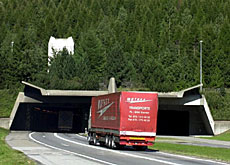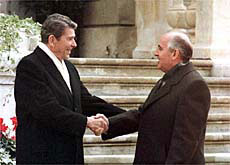Lucerne yields up explosive secrets

Relics of Switzerland’s Cold War defences are turning up in surprising places.
Residents of a quiet area of Lucerne were shocked recently to find that explosives had been buried beneath their streets.
They were planted there by the Swiss army because the road was judged strategically important; in the event of invasion it would have been blown up.
But local people are angry that they didn’t know what was on their doorstep. They were only informed when the army decided to dig the devices up again.
“I got a letter from the defence ministry, telling us there was dynamite buried here on our street, and that they were coming to take it away, “ Rieska Dommann told swissinfo.
“I was amazed, I never knew those explosives were here. This is a purely residential area with no important through routes, so I was very surprised the army had put explosives here.”
Cold war policy
Dommann, who is president of the local residents’ association, was particularly angry to discover that the explosives had been buried in 1989, just as the Cold War was ending.
“Just months before the fall of the Berlin Wall, they decided to put explosives here,” he said.
“I mean it was 1989. The military should have been more aware of the political changes going on – and they certainly should have recognised that burying explosives in a residential area was a ridiculous thing to do.”
But at the headquarters of Switzerland’s defence ministry in Bern, there is still strong support for the policy.
“This was our defence doctrine in the 1960s,” explained Christoph Schuepbach, who works on developing combat infrastructure.
“During the Cold War, the army was Switzerland’s only protection against the Warsaw Pact.”
Strategic sites
And Schuepbach admits that the Lucerne example is not unusual. There are in fact hundreds of strategic roads, tunnels and bridges in Switzerland which conceal permanent stores of explosives.
“But I can’t tell you exactly how many, and exactly where they are, because that information is classified,” said Schuepbach.
Nevertheless Schuepbach has no clear answer as to why a quiet road in Lucerne, right in the middle of Switzerland, should have been thought strategically important.
“Well it’s not such a small road,” he suggested. ”You can drive big vehicles on it.”
But the defence ministry is clear on why explosives should have reached Lucerne as late as 1989. The priority was to place charges under the crucial border regions first, and this was done in the 1960s.
Gradually, the army explosives experts worked their way to the centre of the country, reaching Lucerne just as the Cold War was ending.
Safety questions
Not surprisingly, there are concerns over whether the many stocks of hidden explosives are safe. Two years ago, firefighters arriving to put out the catastrophic fire in the Gotthard tunnel were not at first told that the tunnel too had been mined with explosives.
Although these have since been removed, the army is not planning to remove the explosives from all areas of the country.
“It’s still part of our defence policy,” said Schuepbach. “Who knows what the situation will be in 20 years’ time? We can’t say whether there will be an enemy or not, or what kind of battle there will be.
“So, yes, we are still maintaining several hundred sites with permanent explosives.”
Schuepbach, however, is keen to reassure the Swiss public that these sites are completely safe.
“They are checked several times a year,” he explained. “And although the detonating cords are buried with the explosives, the fuses and secret detonation codes are stored separately, so there’s really no chance of accident or sabotage.”
Public anxiety
But Schuepbach’s words don’t convince young mothers like Madeleine Gröger, out shopping with her children just a stone’s throw from the site of the buried explosives.
“I drive on that road every day with my kids,” she told swissinfo. “I just don’t see the point of having explosives here in the middle of the country.
“And I think it’s unfair that that stuff was there for years and years, and none of us knew about it.”
Gröger is relieved that the explosives in her neighbourhood have been removed now and, by and large, Lucerne residents seem to be dealing with the issue with remarkable good humour.
A cartoon in the local paper shows a couple leaning curiously out of their window in the middle of the night.
“No darling, really, I can’t hear any ticking,” says the woman. “Come back to bed and stop worrying.”
swissinfo, Imogen Foulkes in Lucerne
Hundreds of key roads and bridges across Switzerland hold stores of explosives for use in the event of invasion.
The policy was developed during the cold war, because of fears of an attack by Warsaw Pact countries.
Although some devices are now being removed, hundreds will remain, particularly in the border regions.
The fuses required for detonation are stored separately from the explosives.

In compliance with the JTI standards
More: SWI swissinfo.ch certified by the Journalism Trust Initiative

You can find an overview of ongoing debates with our journalists here. Please join us!
If you want to start a conversation about a topic raised in this article or want to report factual errors, email us at english@swissinfo.ch.